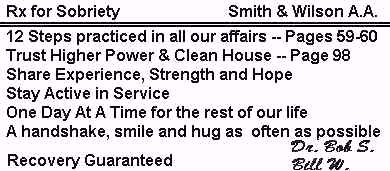

 Click The Images To Go To Page Indicated In The Flag
One of AA's first friends in psychiatry points out "the road beyond the miracle AA Grapevine, September. 1955 My first two or three years of contact with AA were the most exciting in my whole professional life. AA was then in its miracle phase; everything that happened seemed strange, wonderful, out of this world. Hopeless drunks were being lifted out of the gutter. Individuals who had sought every known means of help without success were responding to this new approach. To be close to any such group even by proxy was in itself most electrifying. In addition, professionally, a whole new avenue to the problem of alcoholism had opened up. Somewhere in the AA experience was the key to sobriety. Here was the first authentic clue after many years of fruitless effort. Needless to say, the possibilities ahead were most intriguing. Perhaps I could learn how AA worked and thus could learn something about how people stopped drinking. All of which meant that I shared in the general excitement of those days. I could see some daylight ahead. My future in this regard was now clear: I would try to discover what made AA tick. In this quest for understanding, I would never have gotten beyond first base if it had not been for Bill W. and many of the early members. A study of the Twelve Steps helped a little but of far greater importance were the many insights already possessed by Bill and the others in the process through which AA brought about its results. I heard of the need to "hit bottom," of the necessity for accepting a Higher Power, of the indispensability of humility--ideas which had never crossed my professional horizon and had certainly never influenced my non-professional thinking or attitudes. Revolutionary as they were, they nevertheless made sense and I found myself embarked on a tour of discovery. I began to recognize more clearly what "hitting bottom" really implied and I began to do what I could to induce the experience in patients--always wondering what was happening inside the individual as he went through the crisis of hitting bottom. Finally fortune smiled on me again, this time from another patient. For some period she had been under my new brand of psychotherapy designed to promote hitting bottom. For reasons completely unknown, she experienced a mild but typical conversion which brought her into a positive state of mind. Led by the newly-found spiritual elements, weak though they were, she started attending various churches in town. One Monday morning she entered my office, her eyes ablaze, and at once commenced talking. "I know what happened to me. I heard it in church yesterday. I surrendered." With that word "surrender" she handed me my first real awareness of what occurred during the period of hitting bottom. The individual was fighting an admission of being licked, of admitting he was powerless. If and when he surrendered, he quit fighting, could admit he was licked and could accept that he was powerless and needed help. If he did not surrender, a thousand crises could hit him and nothing would happen. The need to induce surrender became the new therapeutic goal. The miracle of AA was now a little clearer. For reasons still obscure, the program and the fellowship of AA could cause a surrender which in turn would lead to a period of no drinking. As might be expected, I, too, had a thrill all my own. I was getting in on what was happening, always an enjoyable experience. Still questing eagerly, I shifted my therapeutic attack. The job now was to induce surrender. When I tried to cause that I ran into a whole nest of resistances to the idea, totally new territory to be explored. As I continued my tour, it became ever more apparent that, in everyone's psyche there existed an unconquerable ego which bitterly opposed any thought of defeat. Until that ego was somehow reduced or rendered ineffective, no likelihood of surrender could be anticipated. The shifts in emphasis from hitting bottom to surrender to ego reduction all occurred during the first five or six years after my initial contact with AA. I well remember the first AA meeting to which I spoke on the subject of ego reduction. AA, still very much in its infancy, was celebrating a third or fourth anniversary of one of the groups. The speaker immediately preceding me told in detail of the efforts of his local group--which consisted of two men--to get him to dry up and become its third member. After several months of vain efforts on their part and repeated nose-dives on his, the speaker went on to say: "Finally I got cut down to size and have been sober ever since," a matter of some two or three years. When my turn came to speak, I used his phrase, "cut down to size," as a text around which to weave my remarks. Before long, out of the corner of my eye, I became conscious of a disconcerting stare. It was coming from the previous speaker. Looking a little more directly, I could see his eyes fixed on me in open-eyed wonder. It was perfectly clear that he was utterly amazed that he had said anything which made sense to a psychiatrist. The look of incredulity never left his face during my entire talk. The incident had one value in my eyes. It showed that two people, one approaching the matter clinically and the other relying on his own intuitive report of what had happened to him, both came up with exactly the same observation: the need for ego reduction. During the past decade, my own endeavors have centered primarily upon this problem of ego reduction. How far I have been able to explore that territory is not at all certain. I have, however, made a little progress and I shall try first to acquaint you with some of my findings, and second, to relate them to the AA scene as I see it. As I have already stated, the fact that hitting bottom could produce a surrender which cut the ego to size was evident, fairly soon. In time, two additional facts manifested themselves. The second of these two was that surrender is essentially a disciplinary experience. The first is merely repeating a fact known to you all. It is common knowledge that a return of the full-fledged ego can happen at any time. Years of sobriety are no insurance against its resurgence. No AA, regardless of his veteran status, can ever relax his guard against a reviving ego. Recently one AA, writing to another, reported he was suffering, he feared, from "halotosis," an obvious reference to the smugness and self-complacency which so easily can creep into the individual with years of sobriety behind him. The assumption that one has all the answers--or the contrary, that one needs to know no answers and just follow AA--are two other indicators of trouble. In both, open-mindedness is notably absent. Perhaps the commonest manifestation of the return of the ego is witnessed in the individual who falls from his pink cloud, a state of mind familiar to you all. This blissful state is a logical aftermath of surrender. The ego which has been full of striving, just quits and the individual senses peace and quiet within. The result is an enormous feeling of release and the person flies right up to his pink cloud, and thinks he has found Heaven on earth. Everyone knows he will come down sometime but it is perhaps not equally clear that it is ego slowly making its comeback which forces the descent from the pink cloud into the arena of life where, with the help of AA, he can learn how to become a sober person and not an angel. I could go on with many more examples familiar to you all to show you the danger of ever assuming the ego is dead and buried. Its capacity for rebirth is utterly astounding and must never be forgotten. My second finding--that surrender is a disciplinary experience--requires explanation. In recent articles, I have shown that the ego basically must be continuously forging ahead and that it operates on the unconscious assumption that it, the ego, should not be stopped. It takes for granted its right to go ahead and in this respect has no expectation of being stopped and no capacity to adjust to that eventuality. Stopping says in effect, "no, you can't continue," which is the essence of disciplinary control. The individual who cannot take a stopping is fundamentally an undisciplined person. The function of surrender in AA is now clear. It produces that stopping by causing the individual to say, "I quit, I give up my headstrong ways. I've learned my lesson." Very often for the first time in that individual's adult career, he has encountered the necessary discipline which halts him in his headlong pace. Actually he is lucky to have within him the capacity to surrender. It is that which differentiates him from the wild animals. They may be cowed but are never really tamed. They never develop a love for the power of their master which we humans can for the Master who rules us all. And this happens because we can surrender and truly feel, "Thy Will, not mine, be done." When that is true, we have become in fact "obedient servants of God." The spiritual life at that point is a reality. We have become members of the human race. I have now presented the two points I wished to make, namely first, the ego is revivable and second, surrender is a disciplinary experience. I next wish to discuss their significance for AA as I see it. Primarily they say quite simply, "AA can never be just a miracle." The single act of surrender can produce sobriety by its stopping effect upon the ego. Unfortunately that ego will return unless the individual learns to accept a disciplined way of life which means the tendency for ego comeback is permanently checked. This is not news to AA members. They have learned that a single surrender is not enough. Under the wise leadership of the "founding fathers," the need for continued endeavor to maintain that miracle has been steadily stressed. The Twelve Steps urge repeated inventories, not just once, and the Twelfth Step is in itself a routine reminder that one must work at preserving sobriety. Moreover, it is referred to as Twelfth Step work--which is exactly what it is. By that time, the miracle is for the other fellow. The Twelve Traditions are also part of the non-miracle aspect of AA. They represent, as Bill W. has said, the lessons of experience. They serve as guides for the inexperienced; in reality they check the ways of the innocent and unwary. They bring the individual down to earth and present him with the facts of reality. In their own fashion, they say: "Pay heed to the teachings of experience or you will court disaster." It is not without reason that we talk of the "sober voice" of experience. My stress on the non-miracle elements of AA has a purpose. When I made my first acquaintance with AA, I rode the pink cloud with most of its members. I, too, went through a period of disillusionment and, fortunately for me, I came out with a faith far stronger than anything a pink cloud can supply. Mind you, I'm not selling miracles short; they do loosen the individual up. I now know, however, that truth of the Biblical saying, "By their works ye shall know them." Only through hard toil and labor can lasting results be obtained. As a consequence of the need for work to supplement any miracle, my interest in the non-miracle features has grown. I can accept more truly the necessity of organization, of structure which curbs as well as guides. I believe there must be meetings like this one to provide the sense of belonging to a big working organization of which each individual is but a part. And I believe that any group or individual who fails to participate in the enterprises of the organization is rendering himself and his group a disservice by not submitting to the disciplinary values inherent in those activities. He may be keeping his ego free of entanglements but he is also keeping it unstopped. His chances of remaining sober are not of a high order. He is really going it alone and is headed for another miracle which may not come off next time.
Harry M. Tiebout, M.D.
Index of A.A. History Pages on Barefoot's World
As in so many things, especially with we alcoholics, our History is our Greatest Asset!.. We each arrived at the doors of A.A. with an intensive and lengthy "History of Things That Do Not Work" .. Today, In A.A. and In Recovery, Our History has added an intensive and lengthy "History of Things That DO Work!!" and We will not regret the past nor wish to shut the door on it!!
ABC Page 60 -- Barefoot's Recovery Pages
KEEP COMING BACK!
On the Web December, 2008 in the Spirit of Cooperation Three mighty important things, Pardn'r, LOVE And PEACE and SOBRIETY |

